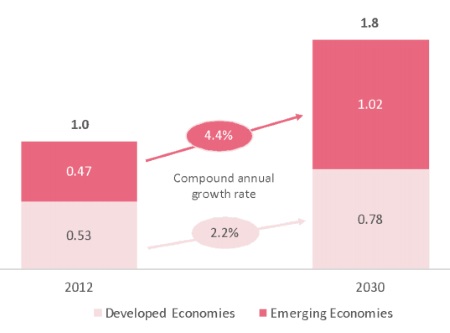
Airbnb gets the UNWTO seal of approval for its sustainable tourism potential
By cameron in Uncategorized
Friends in high places are always worth nurturing, especially for businesses the size of Airbnb. In travel, you don’t get much higher than the secretary-general of the United Nations World Tourism Organisation.
That position is currently held by Dr Taleb Rafai, who has put his name to a Medium blog post – Sustainable tourism in the 21st century – jointly attributed to Christopher Lehane, global head of policy and public affairs at Airbnb.
2017 is the UNWTO Year of Sustainable Tourism and Airbnb joined the UNWTO the year before.
The post says that
“Airbnb’s technology-enabled, people-to-people home sharing has great potential to support households in emerging destinations by helping to cover the costs of everyday expenses, education and entrepreneurship.”
It also says that by 2030, “Airbnb expects that more than 400 million guests will have used the platform to arrive in developing countries since its founding in 2008.”
The focus on “emerging destinations” is relatively new positioning for Airbnb and the business has been working on a number of initiatives. Airbnb has also produced a paper which it describes as “a roadmap for government and NGO partners to use its platform to help lift underserved populations through tourism.”
“Advancing Sustainable Tourism Through Home Sharing” is a comprehensive look at tourism outside the mainstream destinations with the Airbnb-as-a-force-for-good message dominating. But there are some compelling corporate reasons why Airbnb – which has raised $4.4 billion so far and is widely expected to launch an IPO – is looking at emerging destinations and it’s all about growth and volumes.
The UNWTO, which provides the introduction to the report, says that by 2030 emerging economies will welcome one billion arrivals compared with the 800 million visitors to developed economies.

Projected growth of tourist arrivals in emerging and developed economies (billions)
At the same time as tourism is growing more quickly in emerging economies, so too is the propensity of the populations to embrace the sharing economy. The report quotes a development consultancy Dalberg which says:
“People in emerging economies are 40% to 50% more likely to engage in digital sharing than people in the US and Western Europe. In India, 78% of people with access to internet are willing to share their assets or services online for financial gain….significantly higher than the 43% of North Americans.”
The roadmap includes case studies of three initiatives, including its year-old tie-up with SEWA, a trades union which represents two million self-employed women in rural India. The “women’s economic empowerment partnership was the first of its kind for Airbnb,” it says, and started in the state of Gujarat.
While the take-up is modest – 18 homes listed so far – the case study highlights the approach Airbnb hopes to use in building up partnerships, and of course its inventory to sell. It includes a checklist of digital requirements for hosts, which covers basic digital literacy and smartphone familiarity, knowledge of social media and online payments.
One of the challenges identified in the early stages of its project with SEWA was payments, but Airbnb was able to tap its payments partner in India to help overcome this. Airbnb is also using “super hosts” to mentor other potential hosts in the region, and is also providing generic destination marketing support to promote the region.
Cynics might say that the focus on sustainable tourism is an attempt to shift focus away from Airbnb’s widely reported but not really proven role in so-called overtourism. The report addresses these accusations through data:
“A recent study focusing on the 200 cities with the largest number of Airbnb stays estimates that, in total, Airbnb supported 730,000 jobs globally in the 200 cities analyzed, and drove more than $US60 billion in output in these cities. The report also estimates that Airbnb will support approximately 1.3 million jobs in 2017. And with 74% of Airbnb listings located outside of traditional hotel districts in urban markets, many guests stay in less concentrated areas.”
If these benefits can be scaled across emerging destinations and underserved populations, everyone wins, including Airbnb investors.
Related reading from tnooz:
Airbnb and overtourism – let the statistics have their say (Aug17)
Airbnb plays digital inclusion card to get inventory in rural India (Nov16)
Image from SEWA.
![]()

